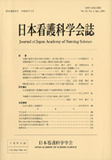Japanese
English
- 販売していません
- Abstract 文献概要
- 参考文献 Reference
- サイト内被引用 Cited by
要旨
在宅高齢者の夜間介護を行う中高年女性家族介護者の睡眠の問題を調べる目的で,夜間介護者9名(65.2±4.8歳)と非介護者9名(66.9±4.2歳)の,睡眠ポリグラフィ,睡眠の主観的評価,疲労の自覚症状,フリッカー値を比較した.
睡眠段階出現率は,介護者の方が非介護者より睡眠ステージ1(S1)が高くS2が低い傾向があった(p<0.1).睡眠周期内睡眠段階出現率は,介護者は非介護者に比べ,第2周期ではS1が高くS2が低く,第3周期ではS3+S4が高かった(p<0.05).主観的睡眠評価は,介護者の方が寝つきに時間がかかり,快適感が低く,起床後に疲れが残っていた(p<0.05).疲労の自覚症状訴え率やフリッカー値でも介護者の方が朝夜とも疲労度が高かった(p<0.05).
これらの結果から,第2周期にS1出現率が高い者が多く第3周期に徐波睡眠率が高い者が多いという夜間介護者の睡眠パターンは,主観的睡眠評価の低さや疲労度の高さと関係があると考えられた.
Abstract
This study describes the sleep patterns and subjective symptoms of fatigue of female family caregivers (age 50 and over) providing routine nighttime care to bed-ridden elderly individuals at home. Their sleep patterns were measured by electroencephalography during the two successive nights at their houses and were compared with those of age-matched female non-caregivers. Subjective sleep was evaluated by a self-administered instrument (the Japanese version of the Sleep Evaluation Questionnaire) for three successive nights. Fatigue was measured by a subjective instrument (subjective symptoms of fatigue) and physiological measurement (critical flicker fusion frequency). Data from nine family caregivers (65.2+/-4.8 y.o.) and nine non-caregivers (66.9+/-4.2 y.o.) were analyzed.
In the analysis of the percentages of sleep stages within sleep period time, the family caregivers had slightly more stage 1 (p<0.1) and less stage 2 (p<0.1). In the analysis of each sleep cycle of the caregivers, significant differences were found in the following variables as compared to those of the non-caregivers: more stage 1 (p<0.05) and less stage 2 (p<0.05) during the second cycle, and more of stages 3 and 4 during the third cycle (p<0.05). The family caregivers reported the fact of taking longer time to get to sleep (p<0.05), less quality of sleep (p<0.05), and less satisfactory physical and mental conditions in the morning (p<0.05) than did the non-caregivers. The family caregivers had higher levels of subjective and physiological fatigue both in the morning and in the evening than did the non-caregivers.
These results suggested that the sleep patterns with the higher incidence of stage 1 during the second cycle and the higher incidence of slow waves during the third cycle were correlated with the extent of the nighttime family caregivers' sleep needs and fatigue.
Copyright © 2000, Japan Academy of Nursing Science. All rights reserved.


